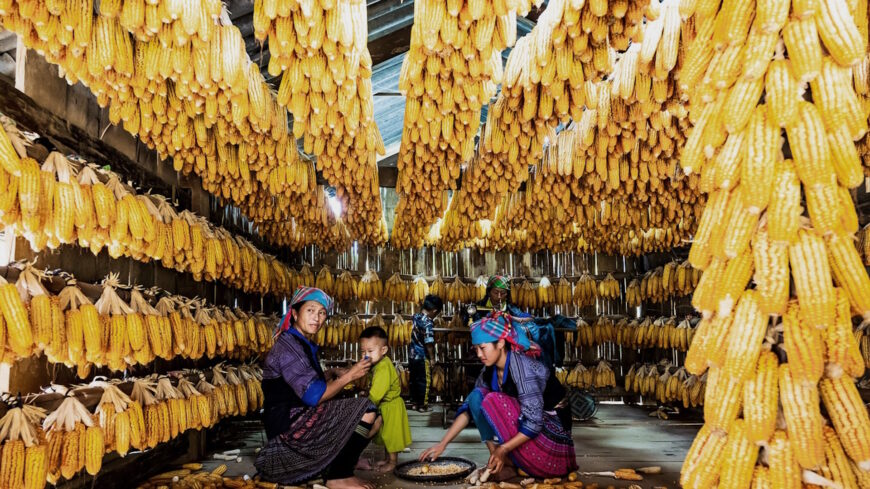
GMO Bio-Imperialism
by Dr. Vandana Shiva, Navdanya International
April 26, 2024
Over the past few decades, GMO crops have been imposed in countries around the world, touted as a solution to food insecurity and malnutrition crises. However, hunger, disease and malnutrition have increased, while biodiversity has declined and toxins have spread. GMO imperialism has destroyed the lives and livelihoods of small farmers and biodiversity in the centers of origin. These centers of biodiversity origin are the cradles of the world’s food supply and protection against disease, climate challenges, natural disasters or other obstacles to food production.
In Mexico, which is the center of origin of corn, there has been a long struggle by society and organized communities against GMO imperialism which threatens the subsistence and culture of local peoples. It is following this mobilization that the Mexican society obtained a ban on planting genetically modified corn through a collective lawsuit brought against the companies Bayer-Monsanto, Syngenta and Corteva Agriscience. This ban is still in effect.
Recently, the Mexican government issued an executive order phasing out the use of glyphosate and banning the use of genetically modified corn in tortillas, a staple food. Faced with this decision, the US government, on the basis of the United States-Mexico-Canada Free Trade Agreement (USMCA), activated the dispute resolution mechanism with the aim of canceling the order and forcing the introduction of GMOs into the country.
The Mexican government as well as the non-governmental organizations from Mexico presented their Technical Opinions before this Panel, based on detailed scientific evidence, including new found evidence by Mexico’s scientific advisory board CONAHCYT, rooted in scientifically rigorous evidence from academic institutions. This evidence pointed out and warned about the multiple risks that make it pertinent and urgent to stop the presence of genetically manipulated maize in the food of the Mexican population, and as raw material for other industries.
From 12 to 16 March 2024, Navdanya International, together with Latin American partners and the Mexican Government, organized a series of events in Mexico City to build a common strategy against the imposition of new and old GMOs. The mobilization in Mexico City counted on the presence of representatives of Latin American movements such as Argentina, Colombia, Bolivia, Costa Rica and others, in collaboration with Mexican civil society organizations, the Ministry of Agriculture and Rural Development, the Ministry of Environment and Natural Resources and the Ministry of Culture. It was at the Ministry of Culture that the Garden of Milpa, the biodiverse traditional farming system of Mexico, was blessed at the Museum of Corn.
The case of Mexico represents the attempt of a people to protect their biodiverse cultures, their thousand-year-old food heritage, the health of their population and ecosystems. It is the case of a people who demand respect for their sovereignty and represents a beacon of hope for the places where this imposition continues. People have the right to have sovereignty over their health, and that starts with food sovereignty.
However, the GMO agenda has always been about patents and profits, not food and health. Food sovereignty is a high-level concept, because it implies the sovereignty of beings to manage and organize themselves and protect their right to health. This is why the goal of industrial agriculture has always been to push farmers off the land. It is inherent in the very definition of industrial agriculture. The sovereignty of people, farmers and nature has been violated by the imposition of agrotoxins, GMOs and ultra-processed foods, destroying diversity and ancient food cultures and threatening land, water and biodiversity.
Agribusiness and biotechnology giants are trying to circumvent existing biosafety regulations, such as the Cartagena and Nagoya Protocols of the Convention on Biological Diversity, by subtly making changes to GMO regulations, in order to promote GMOs under new acronyms, such as NBT (New Breeding Techniques), NGT (New Genomic Techniques) or TEA (Techniques of Assisted Evolution). These new GMOs have been silently inserted into the agricultural legislation in force in various countries, with the aim of maintaining patent monopolies in the hands of the chemical and biotechnology giants.
Today, our seed sovereignty is threatened by intellectual property rights and new GMO technologies that have transformed seeds from a common good into a commodity under the control and monopoly of multinational agri-food companies. Impositions continue to take place, violating the sovereignty and rights of people and nature, in furtherance of the corporate agenda. While multinationals get rich by stealing our biodiversity. Faced with this, building relationships, based on common struggle and the vision of an ecological future, contributes to creating international networks of resistance and solidarity. Together, as global citizens, we must unite to oppose the bullying of GMOs and defend our seeds.
Citizens are rising up against the unscientific, anti-democratic and anti-ecological imposition of GMOs by multinationals and the US government. The first generation of GMOs failed. But multinationals continue to impose genetically modified organisms, or new GMOs, in centers of diversity. They continue to shift the narrative towards framing nature and biodiversity as commodities to be commercialized and monopolized. In the wake of Mexico’s battle against the United States, it is necessary to support and strengthen international solidarity against the corporate imposition of industrial food systems.
Connect with Dr. Vandana Shiva
Cover image credit: Nguyen_Khac

Truth Comes to Light highlights writers and video creators who ask the difficult questions while sharing their unique insights and visions.
Everything posted on this site is done in the spirit of conversation. Please do your own research and trust yourself when reading and giving consideration to anything that appears here or anywhere else.










